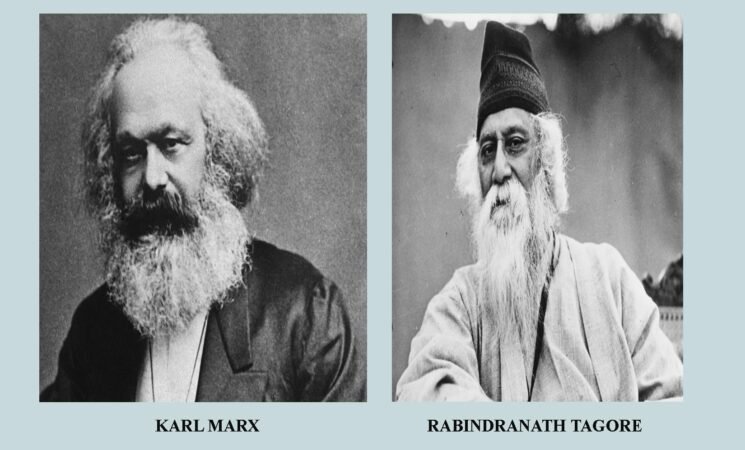14 May 2025, NIICE Commentary 10921
Anurag Paul
In the contemporary world, the relentless pursuit of economic development often comes at the expense of environmental well-being. This paradox is emblematic of the capitalist paradigm, which prioritizes profit and technological advancement over ecological sustainability. As Max Weber observed, such a system alienates individuals from their authentic selves and fosters a destructive relationship with the natural world. This paper explores the ecological dimensions of Rabindranath Tagore's thought as a counterpoint to this prevailing worldview. Drawing parallels with Karl Marx's critique of capitalism's alienating effects, the paper argues that Tagore's concept of "Swadesh" – a holistic approach to self-cultivation – offers a framework for reconciling human needs with ecological imperatives. By emphasizing inner spiritual resilience and a deep connection with the natural world, Tagore's philosophy provides a path toward sustainable development that transcends the limitations of the prevailing capitalist model. This "Green Tagore" framework, rooted in Indian philosophical traditions like Advaita Vedanta and Yoga, encourages individuals to cultivate a sense of ecological consciousness and embrace a more harmonious and sustainable relationship with the planet.
Capitalism, Alienation, and the Ecological Crisis:
Karl Marx's critique of capitalism extends beyond economic exploitation to encompass environmental degradation. In his analysis, capitalism disrupts the "metabolic interaction" between humans and nature, leading to what he termed the "metabolic rift." This rift occurs when human societies, particularly in urban settings, become disconnected from the natural processes that sustain life. Marx argued that capitalist production disturbs the natural cycles by preventing the return of consumed elements to the soil, thereby violating the conditions necessary for lasting fertility. This alienation is not merely a subjective feeling but an objective reality, as workers are estranged from both the products of their labor and the natural world that sustains them. Marx's concept of alienation further illuminates this disconnect. He posited that in a capitalist society, workers become alienated from their labor, the products they produce, their own human nature, and from other individuals. This alienation is a consequence of the division of labor and the commodification of human activity, where work becomes a means to an end rather than an expression of human creativity and connection to nature.
Max Weber's analysis complements Marx's critique by highlighting how capitalism's rationalization and bureaucratization lead to the disenchantment of the world. In his seminal work, The Protestant Ethic and the Spirit of Capitalism, Weber argued that the asceticism of Protestant ethics contributed to the development of capitalism's rational and systematic nature. However, this rationalization process also led to a disenchantment with the world, where individuals become cogs in a bureaucratic machine, losing touch with their authentic selves and the natural world.
Rabindranath Tagore: A Vision of Ecological Harmony:
Rabindranath Tagore's philosophy offers a profound alternative to the capitalist worldview. Central to his thought is the concept of "Swadesh," which transcends mere nationalism to encompass a holistic approach to self-cultivation and ecological harmony. Tagore envisioned a society where individuals are deeply connected to their local environment, culture, and community. He believed that true development arises from inner spiritual resilience and a profound bond with nature, rather than from unchecked industrialization and exploitation. Tagore's ecological vision aligns with the principles of Advaita Vedanta and Yoga, which emphasize the interconnectedness of all life and the sanctity of the natural world. He advocated for an education system that nurtures creativity, spiritual awareness, and ecological consciousness, preparing individuals to live in harmony with the earth. This approach stands in stark contrast to the capitalist model, which often views nature as a resource to be exploited for profit.
The "Green Tagore" Framework: A Path to Sustainable Development:
The "Green Tagore" framework integrates ecological consciousness with spiritual and cultural development. It proposes a model of sustainable development that is rooted in local traditions, community engagement, and a deep respect for nature. This framework encourages individuals to cultivate a sense of ecological responsibility and to embrace practices that promote environmental stewardship. By drawing on Tagore's emphasis on self-reliance and community, the "Green Tagore" framework offers a pathway to development that is both sustainable and culturally resonant. It challenges the capitalist paradigm by proposing an alternative vision of progress—one that is not measured solely by economic growth but by the well-being of individuals and the health of the planet.
Conclusion
In conclusion, the ecological crisis facing the contemporary world is a direct consequence of the alienating effects of capitalism, as articulated by both Karl Marx and Max Weber. However, the philosophy of Rabindranath Tagore offers a compelling alternative. His concept of "Swadesh" provides a framework for reconciling human needs with ecological imperatives, emphasizing spiritual resilience and a deep connection with nature. The "Green Tagore" framework, rooted in Indian philosophical traditions, offers a path toward sustainable development that transcends the limitations of the prevailing capitalist model. By embracing this vision, individuals and societies can cultivate a more harmonious and sustainable relationship with the planet, paving the way for a future where economic development and environmental well-being are not mutually exclusive but mutually reinforcing.
Anurag Paul is a Research Intern at NIICE and is currently pursuing his Master of Arts in Political Science at Indira Gandhi National Open University, India.

